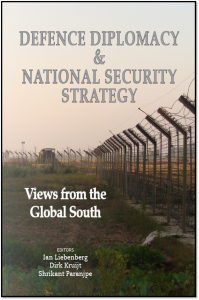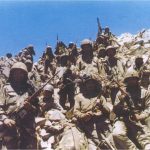
Defence Diplomacy and National Security Strategy – Edited by Ian Liebenberg, Dirk Kruijt and Shrikant Paranjpe was published in 2020. This book is mainly concerned with the defence diplomacy and national security strategy of countries in the Global South especially after World War II and in the post-cold war era. This book is a compilation of different views about the defence diplomacy and security strategy of specific countries.
The introductory chapter in the book traces the emergence of the concept of state. It talks about how countries in the global south reconstructed themselves from the ashes of left behind after imperialism into a full-fledged state. The course of this transformation wasn’t easy especially during the cold war when bloc politics was at its peak and newly independent countries were facing the dilemma of choosing one. The emergence of NAM eventually solved that dilemma. The concept of regionalism that emerged in Asia as well as in Africa and the MENA region continued to be the battleground for the powerful countries. Security regimes emerged- taking over the newly formed democracies and regime change was happening under the umbrella concept of responsibility to protect. The Post-cold war era presented a security dilemma that was the extension of cold war issues. Third world countries or the Global South fought their way to survive through it with their dynamic defence diplomacy, security policies and strategies to build relations and deal with the emerging issues of economies and trade, transfer of sophisticated technologies and deal with the humanitarian crisis. The book is divided into three parts: first dedicated to Latin America, second to the African Continent majorly southern Africa and last part to China and India.
Book then moves on to analysing defence diplomacy pursued by different countries starting with Brazil discussing its defence policies and how the defence sector is working proactively to protect resources by balancing between deterrence and cooperation. The chapter also traces out the changes in the defence policy since the cold war.
The second chapter deals with Chilean Defence Policy. The chapter, to explain Chilean defence policy first explains the dynamics of regional security complex theory in the Latin American Region and how it led to the transformation of Chilean defence and security policy. The author has tried to link both at different points.
The third chapter deals with Columbia. This chapter is divided into two parts. The author says that the first part it has mentioned “how counterinsurgency was raised to a privileged position in the Colombian military doctrine in the second half of the 20th century” and in the second part it looks at the dynamic between the United States and Colombia in the making of a counterinsurgency a la Colombiana.
The fourth chapter deals with Cuba interpreting the Cuban revolutionary internationalism and trace the evolution of Cuba’s formal and Informal diplomatic channels. The chapter also deals with how Cuba’s diplomatic channels influenced Latin American and Caribbean countries. The chapter has divided Cuba’s diplomatic ties into two period- with the Soviet Union and Post – Soviet Union. During USSR’s support to Cuba, it had the second-largest military force in the southern hemisphere and was having large-scale left-wing movements going on in it. But after USSR’s collapse, Cuba’s foreign policy transformed itself into soft power and peace assistance.
The fifth chapter deals with Venezuela and its revolutionary policies. Led by Chavez, the foreign policy of the country was aim at the integration of the Latin American continent – a landmass not dominated and directed by the US. After elected as a President, Chavez drastically changed the role of defence forces in the country and transformed it into an apparatus for national development and service provider to the poor and unprivileged. Venezuela followed the principle of Socialism and was one of the closest allies of Cuba and Castro. Petro-diplomacy flourished as a concept. But after his demise, his successor Maduro couldn’t continue his legacy.
Chapter Sixth and Seventh deal with the defence diplomacy and the security dimension of South Africa. South Africa’s foreign policy was nurtured by the leadership of personalities like Nelson Mandela, Thabo Mbeki, and Jacob Zuma. South Africa tried to form its defence policy on the lines of foreign policy – based on cooperation in the world as well as in the region. SA tried to not represent itself as a hegemon to its neighbours but as an ally and make a constructive contribution to the reconstruction, and development, peacekeeping and peacemaking and proactive involvement in resolving conflict. Also, SA’s national security need guides to sync with the country’s democracy after clearly assessing all the upcoming challenges and difficulties for the country as well for the whole African continent.
Chapter Eighth discusses Namibia and its defence diplomacy and national security policy. UN played an important part in the country’s independence. Chapter traces out the development of the country’s defence forces, policy development for the same and contribution of Namibian defence forces on different occasions i.e., peacekeeping and joint exercise.
Chapter Ninth discusses Zimbabwe and the interplay between its defence diplomacy and foreign policy since the turn of the millennium. The constitutional obligations of the Zimbabwe Defence Forces (ZDF) underscore the role of the military in fulfilling the country’s foreign policy objectives. Later, the chapter traces the evolution of the country’s defence forces and their different objective.
Chapter Tenth deals with China and its trajectory of development since its independence in the realm of politics, military, economy, region and space too. Once called the sleeping giant, China became one of the major political power in the Global South and it slowly and steadily developed its economic strength during the cold war. Since the 1990s, China started to emerge as a regional hegemon and aspiring global hegemon. The chapter traces the development of China in different continents and space to highlight the increasing reach of China in every sphere.
The last three chapters deal with India and its military diplomacy and strategies. It touches on the development of Indian defence diplomacy and how it has transformed ever since the cold war era. The country has transformed itself into a strong power in the region as well as in the world after the initial shocks in the form of wars with neighbours. The next chapter highlights the important natural as well as artificial resources that India possess and how valuable they are for the development of the nation. And lastly, it chalks out the development of India’s defence policy, its goals, how it is inspired by India value system and how it has transformed itself according to the chaining time.
In short, this book deals with the defence diplomacy, security policy and development of defence forces of the countries of the Global South. Since the book is written by different authors, there’s no connection between the chapters. However, each chapter deals with a different country uniquely and traces out the trajectory of the defence mechanism of each of them.















